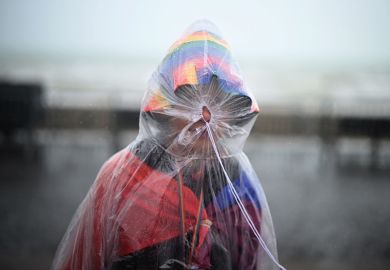We suffer. There’s no doubt about that. The question is what one is to do about it. What should one do about the knocks in life? We are certainly vulnerable to them. But how vulnerable or invulnerable should one be, or indeed, can one be? As Todd May points out, being vulnerable is not a project in life; rather, it is the default position, just the way we are and, in that sense, separate from how we should be, whereas “invulnerabilism” is a possible normative project. May is concerned that making oneself invulnerable would eliminate a lot of the good and valuable things that come with being vulnerable – that is, allowing the possibility that one will suffer from knocks that may go along with a certain good and valuable way of life.
My response to this is that, for most of us, losing vulnerability is such a remote possibility that moving in the direction of a bit more invulnerability wouldn’t do us any harm at all; the danger, if it is one, of too much invulnerability is small, and of total invulnerability, infinitesimally so. And it would do us no harm in two senses.
One is that being vulnerable is a fine way to live provided you can take it and it doesn’t break you. (Like promiscuity: great fun, possibly, if you’re psychologically tough enough.) May admits that when the Queen of Darkness visits him, he suffers, but is confident that he can shoulder his way through until it goes away. Not everyone can or does. A buffer against being crushed, or just damaged too greatly and for too long by the vicissitudes of life, wouldn’t, for them, be a bad thing at all. And in my view, “them” might be anyone, and you won’t know whether you’re such a one until it happens and it is, in a sense, too late.
The other sense is the simple idea that if you are not inwardly peaceful, you cannot be happy or enjoy anything. And like that, you’re not much use to other people either. This is the point of mediation: to change bad mental habits, primarily that of being merely subject to thoughts passing through one’s mind, like an elephant crashing around a room, into good mental habits where one is more in control of them, based on the realisation that not only are they just thoughts but your thoughts, after all. Once you realise that you can control or let the thoughts pass, it’s curiously liberating. You don’t have to put up with it and let yourself be knocked about as much as you think you did. Going along with this is the awareness that there are lots of things one cannot control or change in the world. What matters, in the end, is how one reacts to them in one’s head as far as their being something one can live with, tolerate or even enjoy. This involves, one might contend, not so much detachment as avoiding the wrong kind of self-centred attachment.
This is a fine book addressing matters central to living a life. It’s a touch over-burdened with detail about various positions, but it is always lucidly written.
John Shand is associate lecturer in philosophy, The Open University.
A Fragile Life: Accepting Our Vulnerability
By Todd May
University of Chicago Press 232pp, £19.00
Hardback ISBN 9780226439952
Published 24 March 2017
Register to continue
Why register?
- Registration is free and only takes a moment
- Once registered, you can read 3 articles a month
- Sign up for our newsletter
Subscribe
Or subscribe for unlimited access to:
- Unlimited access to news, views, insights & reviews
- Digital editions
- Digital access to THE’s university and college rankings analysis
Already registered or a current subscriber? Login




